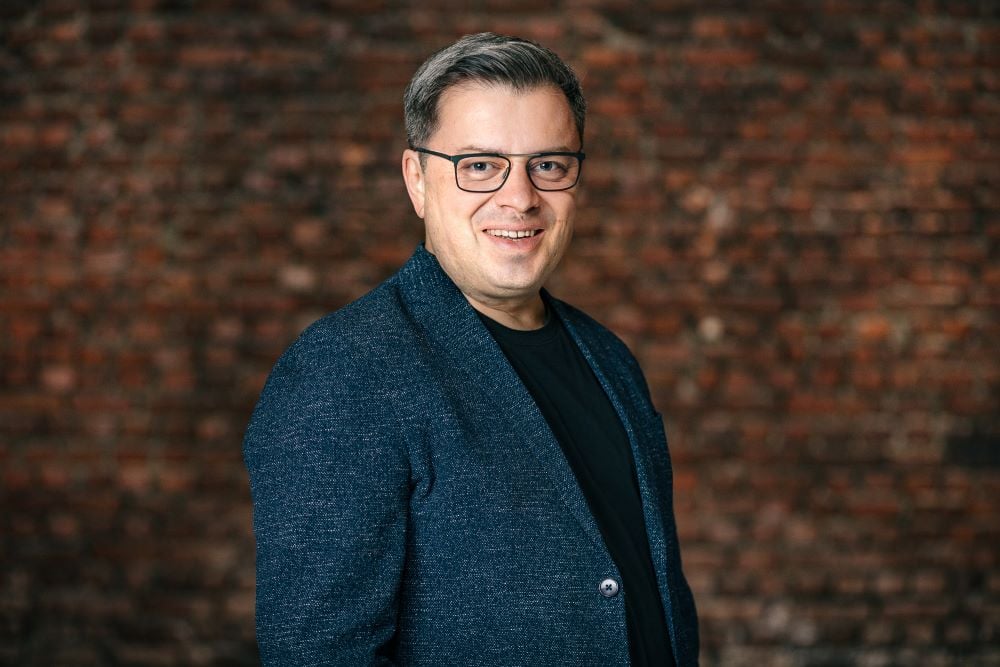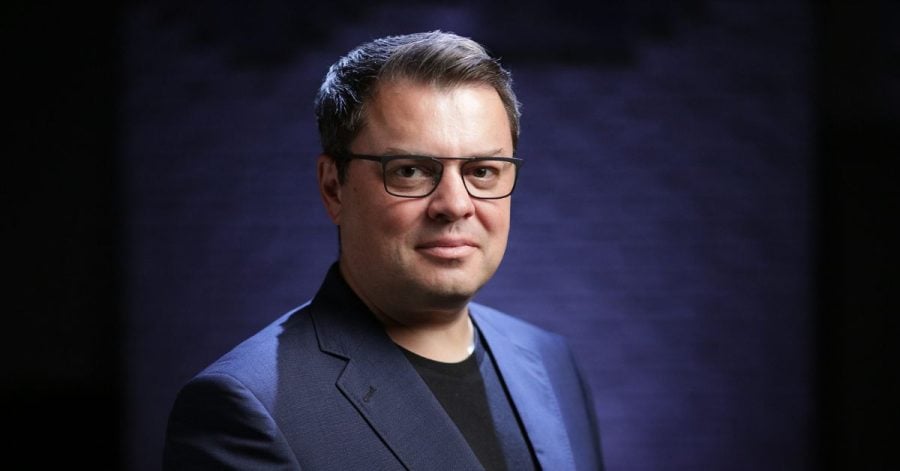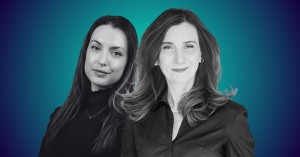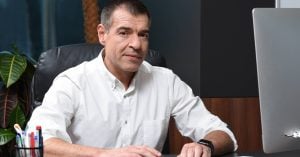Witnessing an ecosystem’s evolution is all about observing and talking to its core pillars. One of the first entrepreneurs to taste international success in Romania and a fruitful exit internationally, is Andrei Pitis, a developer, founder, investor, and mentor to many.
Andrei Pitis is the founder of Simple Capital, a private investment vehicle through which he is supporting local startups with global aspirations. He is also part of Pentest-Tools, Softbinator Technologies, and Bittnet Group; and has had a successful exit to Fitbit with his wearable tech, Vector Watch, back in 2016.
His technical background in computer science made him aware from an early age of the potential of technology and entrepreneurship. So, Andrei invested in many startups, like Clevertaxi, and founded educational programs like the Innovation Labs.
In the interview below, the deep tech entrepreneur shares with The Recursive insights about his journey so far, how he aims to inspire a new generation of tech founders, what he is building, and what he wishes to see more of in Romania.

The Recursive: You began your career as a tech professional, which led to entrepreneurship. What can you share with us about this journey?
Andrei Pitis: I began my career during my university years, working for a small company that belonged to one of the professors. This was in the 90s, exactly after the revolution. I was lucky to be part of that team.
We created the Romanian Education Network, and having access to the internet, I discovered an operating system, Linux. I contributed to some kernel modules, and together with a friend, we had a package that was officially recognized as being part of Linux. That is how I got to be known, mostly in the US.
Entrepreneurship was a normal next step because I had a small team and we started developing projects for various customers.
How has your vision of success changed along the way from programmer to entrepreneur, investor, and mentor?
It’s interesting. My vision of success changes every three to four years when I change what I am doing.
I began as a programmer, then I was an entrepreneur for a few years, next an opportunity came, and I got hired by a U.S. startup this time. After that, I got back to entrepreneurship, but with a bigger vision, then I got hired again, at a higher level. So, you see, I grew somehow in circles.
Personal growth is the driver. I learned through a combination of reading and talking to and working with other people from diverse backgrounds. The key to a company’s acceleration is the entrepreneur’s evolution.
The company can grow in direct proportion to the entrepreneur that drives it.
One of your most successful endeavors has been building and selling Vector Watch. What lessons have you learned developing the product?
One of the biggest lessons I learned was that you cannot build something big without a diverse team.
Wanting to build a product from zero made a lot of people tell me I was crazy. I could not believe them, but now I see it was crazy. I am happy and grateful for that journey. From an idea one day to see the products in a box on the shelves of a shop.
I remember asking myself how this will happen. I learned that you need to work with different people and I thank everybody from my investors to my co-founders to my employees, and my partners.
It is hard to communicate with people that are very different from yourself. And you have to work hard to develop and embrace other people’s points of view to communicate. Some of them were Romanian, but most of them were not. They were from the UK, U.S., India, China, and Japan, to name a few. Working with all of these cultures was enlightening.
What can you share about exiting the company?
In this market, it’s impossible to survive as a mono-brand. It is complex to get a new model out every year. Yes, it’s possible to launch and sell products and become profitable. But after a while, brands are bought by bigger companies as most wearables are conglomerates.
I don’t get attached to businesses, those are transactions in the end, but I do get attached to people.
Do you consider yourself an entrepreneur or more of an investor now?
I started investing a couple of years ago and I am now helping that portfolio grow, but I am starting to get back to entrepreneurship, doing some products on my own. I like working with people and helping them develop, but I also like developing products.
I do not consider myself an investor because I have not raised money. I have great admiration for the investors that raise funds, invest the money, and then make all of this a profitable venture. This is huge, it requires a lot of focus and determination to follow up on the investments. It’s excel sheets and projections and risk assessment.
Can you share with us what you are going to do next in the entrepreneurial sphere?
It’s not specific, yet, but I want to provide tools that bring value to other programmers. I think that one of the strengths of the Romanian ecosystem is the tech talent and I am lucky to work with some of the best. Although the borders between countries disappear when one developer can speak with another developer from any country.
How has your modus operandi as an investor evolved with each experience?
Even this has changed over the years. Back in the day, when I started investing, I didn’t have a lot of money. I picked carefully the startups that I invested in and I put a lot of effort into helping the businesses succeed.
I do look at the team, mostly at the entrepreneur’s drive. I want to see if they have the same interests to succeed. That’s the most important part. Then, I look at the market. Sometimes I invest in markets that I know, and other times in those I want to learn more about. Now, for deep-tech startups, I also look at the product as I want to see if it provides value to other technical people.
Your portfolio also includes a few female-led companies, like Garderoba Infinita by Adriana Ancuta, Yummdiet.com by Cori Gramescu, and Ready for IT by Paula Avasiloaie – what made you invest in them?
Garderoba Infinita was in the fashion industry and I didn’t know anything about that, so it was a great learning experience. What made me invest was the determination that Adriana has.
With Cori, I invested in a domain – fitness and nutrition, that I did know something about, but what drove me was the fact that she already had a business that was profitable at the time and she wanted to expand it internationally. I thought I could help with that and she is executing it already. She is very driven and resourceful as an entrepreneur.
Paula is the most recent investment along the lines of the dev tools. She is doing a Ph.D. in Computers while building a training project that aligns with technical tools. When developing a technical product or an app, tech startups don’t have only programmers. There are a lot of specialists in sales, marketing, management, user experience, design, and customer service that need to learn and communicate about it. She wants to bridge this gap.
What is your opinion about the gap between genders when it comes to tech startup founders and diversity in a team?
I have always had a good percentage of female employees. I think there is a good percentage of women in local universities and abroad. However, on the entrepreneurship part, the percentage is low. And I think they would be very successful.
I encourage women to be entrepreneurs whenever I get to speak at events, but then the net result is that very few women have a startup; technical female founders are rare, like Paula.
To be an entrepreneur you need to look around carefully and discover a problem that can be fixed better than others. This is not limited to men. But what I have seen is that men are a little bit less risk averse, they are more risk takers. But both men and women are well equipped to discover problems, and then fix them.
Can you name some startups that you follow and that inspired you in a way?
I follow Whoop, which offers a fitness band that tracks sleep and other things. With Romanian founders, I follow Fermyon Technologies, for which I am happy to have invested a small amount of money. Radu Matei, one of the co-founders, was part of the Innovation Labs program that I co-founded along with Razvan Rughinis 10 years ago and is still going.
I also offer advice to a couple of blockchain startups, one is Elrond, and the other is BwareLabs. I am focusing only on deep tech blockchain startups because this is what I understand. And they inspire me in many ways.
I am also an investor and I follow Pentest-Tools and Softbinator Technologies. Deepstash is my daily dose of inspiration, like an Instagram for ideas. And there are many more.
You have witnessed the evolution of the tech startup ecosystem in the past 10 years, you have seen its strengths and weaknesses, and you are also familiar with international ones, like the U.S. ecosystem. Where should Romania be after another decade?
Ten years ago there was no ecosystem. We were a few people working on the shoulders of companies like RAV Antivirus from Radu Georgescu, and Bitdefender in the cybersecurity area that broke the international barrier.
Back then, we needed accelerators, conferences, VCs, and successes, to prove that it can be done. And now we have it, we have UiPath, which puts Romania on the map. People are interested in solutions coming out of the country.
What we need now are more entrepreneurs that can address the global market.
This is what we are trying to do at Innovation Labs, inspire young people to take this path in life. And there are many more initiatives at the university level and I am happy about that.
The internal market is not the right one for startups. You can make it only if you are number one with a technological product. In the U.S., even if you are the number 100 or 1000, you could be making a lot more money than in Romania. It’s a vast market.
Of course, we also need a legal system that supports entrepreneurs. It’s still too complicated. Most of my companies are in Romania and it’s a hassle. People are competent in tech, but outside of it, when it comes to local regulations, it’s not clear what a software business is, yet.







